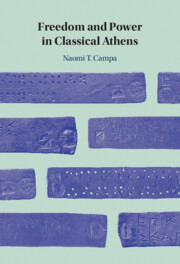I have made an effort in this book to balance faithfully representing the Greek text and remaining accessible to a variety of readers. To this end, I have adopted the following practices with regards to Greek. All passages are both quoted in Greek and translated to English. If a Greek word appears for discussion within the text, it appears in Greek characters along with a transliteration or translation as appropriate. The general index contains transliterated and translated terms. Finally, Greek proper names and place names are generally transliterated unless they are familiar in their Latinized form, in which case the latter is used. Thus, Alcibiades, not Alkibiades, but Apollodoros, not Apollodorus.
For Greek texts, I primarily utilize Oxford Classical Texts. Works from the following authors instead are from the following editions: Antiphon is from the Cambridge Greek and Latin Classics edition (Reference GagarinGagarin 1997), Aeschines is from the Teubner edition (Dilts 1997), Isaeus is from the Loeb edition (Forster 1927), Isocrates is from the Budé edition (Mathieu and Bremond 1929–66), and the “Old Oligarch” is from the Aris and Phillips edition (Reference Marr and RhodesMarr and Rhodes 2008). Translations of Attic oratory are based on the University of Texas Oratory of Classical Greece series. Other translations are my own or based on others where noted.
Ancient Works
Where possible, the abbreviations of ancient works follow Simon Hornblower and Anthony Spawforth, eds., The Oxford Classical Dictionary, 4th edition (Oxford 2012).
- Aeschin.
Aeschines
- Andoc.
Andocides
- Antiph.
Antiphon
- Ar.
Aristophanes
- Ach.
Acharnians
- Plut.
Plutus
- Arist.
Aristotle
- Metaph.
Metaphysics
- Pol.
Politics
- [Arist.]
ps.-Aristotle
- Ath. Pol.
Athēnaiōn Politeia
- Dem.
Demosthenes
- Ep.
Epistles
- Ex.
Exordia
- [Dem.]
ps.-Demosthenes
- Eur.
Euripides
- Supp.
Suppliants
- Hdt.
Herodotus
- Hom.
Homer
- Il.
Iliad
- Isae.
Isaeus
- Isoc.
Isocrates
- Lys.
Lysias
- [Lys.]
ps.-Lysias
- Pind.
Pindar
- Isthm.
Isthmian Odes
- Pyth.
Pythian Odes
- Pl.
Plato
- Plt.
Statesman
- Resp.
Republic
- Polyb.
Polybius
- Soph.
Sophocles
- Ant.
Antigone
- Thuc.
Thucydides
- Xen.
Xenophon
- Cyr.
Cyropaedia
- Hell.
Hellenica
- Lac. Pol.
Constitution of the Lakedaimonians
- Oik.
Oikonomikos
- [Xen.]
ps.-Xenophon
- Ath. Pol.
Athēnaiōn Politeia
Modern Works
- Agora
The Athenian Agora. Results of Excavations Conducted by the American School of Classical Studies at Athens (Princeton 1953–)
- AIO
Attic Inscriptions Online (2012–)
- AIUK
Attic Inscriptions in UK Collections (2018–)
- CID
Corpus des inscriptions de Delphes (Paris 1977–)
- IG
Inscriptiones Graecae (Berlin 1873–)
- LSJ
H. G. Liddell, R. Scott, and H. S. Jones, Greek-English Lexicon, 9th ed., with Supplement (Oxford 1996)
- Osborne
M. J. Osborne, Naturalization in Athens, 4 vols. (Brussels 1981–3)
- RO
P. J. Rhodes and R. Osborne, Greek Historical Inscriptions, 404–323 bc (Oxford 2003)
- SEG
Supplementum Epigraphicum Graecum (Leiden 1923–)
- Smyth
H. W. Smyth, A Greek Grammar for Colleges (New York 1920)
